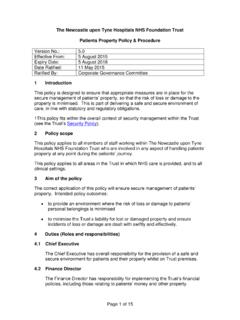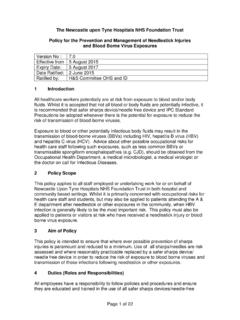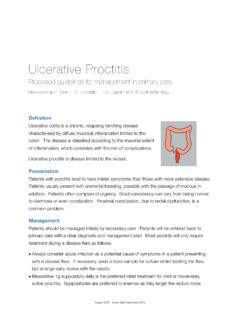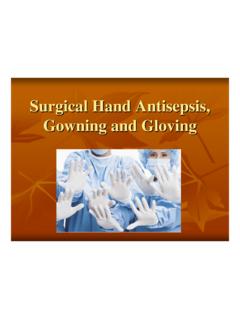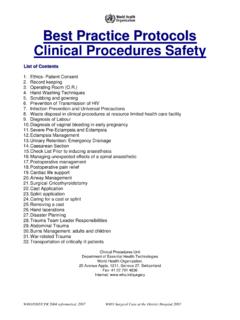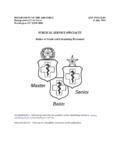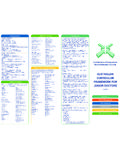Transcription of Infection Prevention and Control Practice in the Operating ...
1 Page 1 of 13 The Newcastle upon Tyne NHS Hospitals Foundation Trust Infection Prevention and Control Practice in the Operating department Version No : 4 Effective from 19 May 2017 Expiry Date: 19 May 2020 Date Ratified: 25 April 2017 Ratified by: Clinical Policy Group 1. Introduction Good Infection Prevention and Control is essential to ensure that patients who undergo any surgical procedure within the Operating theatre receive safe and effective care. The standard required for the fabric of the theatre environment is addressed in the policy for Microbiological Air Sampling of Operating Theatres. This policy considers the practises in a working Operating department . The needs of children and young people have been considered in relation to this policy and the principles of this policy apply equally to children and young people across the Trust.
2 Effective Infection Prevention and Control must be part of everyday Practice and be applied consistently by everyone. Safe working practices must be followed for all patients regardless of known or suspected Infection . The principle upon which this Practice is based is that of Standard Precautions . Blood and body fluids of all patients must be considered potentially hazardous for blood borne viruses. Standard precautions assess the activity to be completed and not the individual who is to receive the care. All patients have the right to be treated with dignity and respect, and the use of standard precautions eliminates the risk of random inappropriate Practice , and permits staff to deliver high standards of care to all patients at all times. 2. Policy Scope The Trust expects that all staff who work in the perioperative environment will adhere to the principles of this policy.
3 This policy provides instruction on the principles of perioperative Practice in relation to Infection Prevention and Control (IPC). 3. Aim of Policy The following guidelines are recommended for Operating department staff when invasive procedures are carried out thereby protecting both patients and staff. Every procedure carried out in the Operating department should be assessed in terms of blood/body fluid loss and precautions taken accordingly. 4. Duties All healthcare workers in theatres have a responsibility to ensure that they are compliant with this policy. Clinical Directors, supported by the Directorate Managers, Matrons will help to ensure that this policy is applied with the support of the DIPC and IPC team. Page 2 of 13 5. Definitions Definitions are given throughout the policy.
4 6. General Principles Health care workers carrying out exposure prone procedures All staff carrying out exposure prone procedures must have evidence of hepatitis B virus immunity or provide evidence that they do not have active hepatitis B virus Infection . Any staff member who does not have immunity to hepatitis B virus will be required to undergo annual screening to ensure they do not have hepatitis B virus Infection . Staffs who are new to the NHS, performing exposure prone procedures for the first time, or at the beginning of training which requires them to perform exposure prone procedures will also be required to provide evidence that they do not have current HIV or active Hepatitis C virus Infection . Staff who know or suspect that they may have been exposed to HIV, Hepatitis B virus or Hepatitis C virus Infection should not undertake exposure prone activities.
5 Further guidance must be sought from the Occupational Health department . Reference should be made to the current Newcastle Hospitals NHS Foundation Trust policies for Immunisation for Trust Staff and Protection against Infectious Disease and Hepatitis B, Hepatitis C and HIV policy for Healthcare Workers. Theatre Attire Personnel are able to influence the environment by maintaining personal hygiene, wearing theatre attire correctly, reporting health problems, monitoring visitors and maintaining a clean environment. Theatre attire is designed to minimise the transfer of micro-organisms from the mucous membranes, skin and hair of the surgical team to the patient. It also provides the surgical team with some protection from the patient. Staff working within the theatre environment and those entering the individual Operating theatre must comply with the Surgical Scrub, Gown and Glove Procedure document: Wear approved reusable theatre scrubs supplied by the Trust.
6 These must be changed daily or following contamination and sent for laundering though the agreed Trust laundry provider. See Trust Used Laundry Management Policy Wear disposable hats/hoods to completely cover the hair. Hats/hoods must be worn when entering the theatre at all times Jewellery is a hazard in theatres; wrist watches and jewellery of any kind (including dress rings and bangles) must not be worn. Wedding rings harbour bacteria so should be removed when scrubbing wherever possible Earrings are dangerous in that they may fall into a wound and therefore must not be worn Masks: scrubbed personnel must wear surgical masks to completely obscure the mouth and nose. Masks must be handled and removed by the tapes and discarded at the end of each case. Circulating personnel Page 3 of 13 and surgeons performing certain procedures need not wear a mask.
7 This is at the discretion of the surgeon. FFP3 Mask or equivalent (high efficiency masks) must be available in theatre for procedures that may expose personnel to Mycobacterium tuberculosis ( aerosol generating procedures). Any theatre personnel using FFP 3 masks must be fit tested prior to using these masks in a clinical situation Eye Protection: Full face visors or protective goggles/glasses must be available for all staff. These must be worn during invasive procedures. These should either be disposable or decontaminated according to manufacturer s instructions after use. Ordinary prescription spectacles do not provide sufficient protection. Visors cannot be used with magnifying loupes. Loupes should, therefore, be fitted with side shields Scrub gowns: The scrub team should either wear disposable fluid repellent gowns or reusable gowns that are provided by the organisation and returned to a central Trust approved laundry, following use Additional gowns: Parents entering the Operating theatre should change into theatre attire.
8 This includes a hat. Parents who are only entering the anaesthetic room may continue to wear their own clothing and footwear but must wear an over gown. In exceptional circumstances local agreement may be made, to facilitate the smooth transfer and induction of the patient in stressful/traumatic circumstances Footwear: Dedicated personalised closed toe non-slip footwear must be available for all regular theatre staff in the theatre complex. Boots should be worn if there is a high risk of heavy blood/body fluid loss. Observers to theatre procedure within the Operating theatre must be provided with spare theatre shoes. Theatre staff are responsible for decontaminating their footwear following each procedure. In some departments central SSD washing of shoes is now provided. This service must be used where available Parents who are required to enter the theatre for a short time prior to surgery should wear designated theatre shoes (overshoes must not be used).
9 Parents who are only entering the anaesthetic room may continue to wear their outdoor shoes Use of over Gowns: Over gowns must be used when staff are required to leave the theatre in theatre attire for essential visits to other areas such as wards or other theatre units. A clean gown must be put on before leaving the theatre suite, fastened correctly and then discarded immediately upon returning or entering the theatre reception. Hats and masks must be removed prior to leaving the theatre suite. Staff should not leave the Operating Theatre in theatre shoes if visibly stained refer to Dress, Appearance and Uniform Policy Maintenance staff and other visitors: Any visitors to theatre must report to reception or the person in charge prior to entering the theatre complex. Theatre staff will advise on the appropriate dress code required for the individuals visit Movement in Theatre and the Theatre Complex Every effort must be made to reduce wherever possible the movement in and out of theatres of staff during open procedures.
10 Doors to remain closed in Page 4 of 13 order to maintain recommended temperature, humidity and air pressure. Theatre staff must be diligent in relation to minimising theatre traffic during Operating procedure the team lead is responsible for ensuring that the ventilation is working and that the humidity is in a safe zone prior to the Operating list starting. Hand Hygiene and Use of Gloves Cuts and abrasions must be covered with a dressing that is waterproof. Contamination with blood or body fluid must be immediately washed with soap and water. Staff that have exudating lesions, eczema or similar skin conditions should be reviewed by the Occupational Health department before participating in exposure prone procedures. Hands must be decontaminated before and after every patient contact, as soon as patient safety permits.



